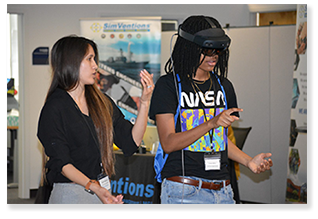Faculty Advisor/Mentor
Yuzhong Shen
Location
Virginia Modeling, Analysis and Simulation Center, Room 2100
Conference Title
Modeling, Simulation and Visualization Student Capstone Conference 2023
Conference Track
Education & Training
Document Type
Paper
Abstract
This paper discusses the development of a virtual laboratory for simulating electronic instruments commonly used in science and engineering courses, such as function generators and digital storage oscilloscopes. Mathematical equations are used to represent continuous signals and ensure signal integrity, while C# delegates are adopted to enable communication between simulated devices. The approach allows for loose coupling between software components and high cohesion of individual components, and can be applied to other virtual laboratory developments. The virtual laboratory provides a means for students to gain hands-on experience with electronic instruments and improve their understanding of theoretical concepts.
Keywords:
Virtual environment, Education, Simulation
Start Date
4-20-2023
End Date
4-20-2023
Recommended Citation
Li, Yiyang; Shen, Yuzhong; and Sukenik, Charles I., "Simulating Function Generators and Oscilloscopes in a Virtual Laboratory Environment" (2023). Modeling, Simulation and Visualization Student Capstone Conference. 1.
https://digitalcommons.odu.edu/msvcapstone/2023/educationandtraining/1
DOI
10.25776/vrbs-wd47
Included in
Computer Engineering Commons, Educational Technology Commons, Engineering Education Commons, Online and Distance Education Commons, Science and Mathematics Education Commons
Simulating Function Generators and Oscilloscopes in a Virtual Laboratory Environment
Virginia Modeling, Analysis and Simulation Center, Room 2100
This paper discusses the development of a virtual laboratory for simulating electronic instruments commonly used in science and engineering courses, such as function generators and digital storage oscilloscopes. Mathematical equations are used to represent continuous signals and ensure signal integrity, while C# delegates are adopted to enable communication between simulated devices. The approach allows for loose coupling between software components and high cohesion of individual components, and can be applied to other virtual laboratory developments. The virtual laboratory provides a means for students to gain hands-on experience with electronic instruments and improve their understanding of theoretical concepts.


